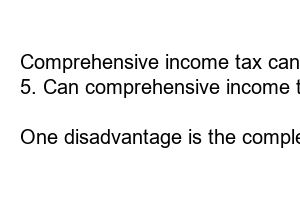종합소득세 대상자
Subject to Comprehensive Income Tax: Everything You Need to Know
In the complex world of taxation, one term that often comes up is “subject to comprehensive income tax.” But what does it mean exactly? In this blog post, we will break down the concept of comprehensive income tax and provide a comprehensive understanding of how it works.
1. Understanding Comprehensive Income Tax
Comprehensive income tax is a taxation system that aims to capture the full range of an individual’s income, including both realized and unrealized gains. This means that not only the income earned through traditional sources such as salaries and wages is taxed, but also income generated from investment returns, rental properties, capital gains, and other sources.
2. Key Components of Comprehensive Income Tax
Comprehensive income tax typically consists of several key components, including taxable income, deductions, exemptions, and tax rates. Taxable income refers to the total income that is subject to tax after accounting for deductions and exemptions. These deductions and exemptions help reduce the overall tax liability.
3. Calculating Comprehensive Income Tax
To calculate comprehensive income tax, individuals must determine their taxable income based on the applicable tax rates and brackets. The tax rates can vary depending on the jurisdiction and the individual’s income level. Understanding the tax brackets is essential to ensure accurate calculation and compliance with the tax laws.
4. Advantages and Disadvantages of Comprehensive Income Tax
One of the main advantages of comprehensive income tax is its ability to capture a broader range of income sources, ensuring a fair and equitable distribution of the tax burden. However, it can also be more complex and time-consuming to calculate compared to other taxation systems. Individuals may require professional assistance to accurately calculate their tax liability.
5. Comprehensive Income Tax Planning
As comprehensive income tax takes into account various sources of income, effective tax planning becomes crucial. Adopting tax-efficient strategies such as utilizing deductions, exemptions, and contributing to tax-deferred retirement accounts can help reduce the overall tax liability and maximize the after-tax income.
6. The Future of Comprehensive Income Tax
With an increasing focus on income equality and a global move towards more progressive taxation, comprehensive income tax is likely to gain more prominence. Governments around the world are exploring ways to ensure that wealthy individuals and corporations contribute their fair share of taxes. As a result, the comprehensive income tax system may continue to evolve in the future.
Summary:
Comprehensive income tax encompasses all sources of income, both realized and unrealized. It includes income from investments, capital gains, rental properties, and other sources. Calculating comprehensive income tax involves determining taxable income based on applicable tax rates and brackets. Though it captures a wider range of income, it can be complex and time-consuming to calculate. Effective tax planning is crucial to minimize tax liability. As the focus on income equality grows, comprehensive income tax is likely to play a more significant role in the future of taxation.
Frequently Asked Questions (FAQs):
1. Is comprehensive income tax the same as regular income tax?
No, comprehensive income tax covers a broader range of income sources and includes both realized and unrealized gains.
2. Do I need to hire a tax professional to calculate my comprehensive income tax?
While not mandatory, seeking assistance from a tax professional can ensure accurate calculations and maximize tax-saving opportunities.
3. Are there any tax deductions or exemptions specific to comprehensive income tax?
Deductions and exemptions vary by jurisdiction. It is recommended to consult a tax advisor to identify applicable deductions and exemptions.
4. How does comprehensive income tax impact businesses?
Comprehensive income tax can affect businesses by taxing their various income sources, including profits, capital gains, and dividends.
5. Can comprehensive income tax be minimized through legal means?
Yes, comprehensive income tax can be minimized through various legal tax planning strategies, including deductions, exemptions, and retirement contributions.
6. Are there any disadvantages to comprehensive income tax?
One disadvantage is the complexity of calculating comprehensive income tax compared to other taxation systems. This may require professional assistance to ensure accuracy.

